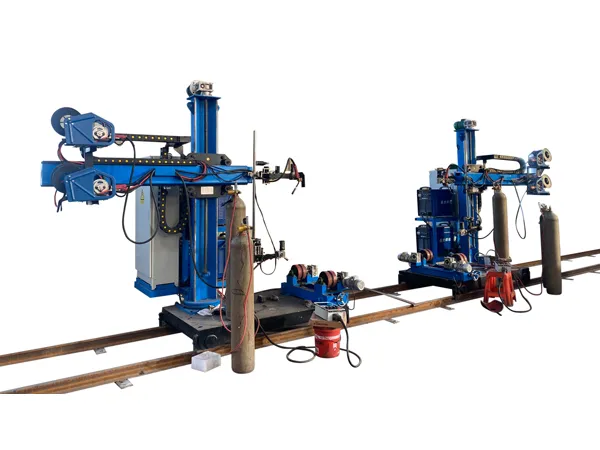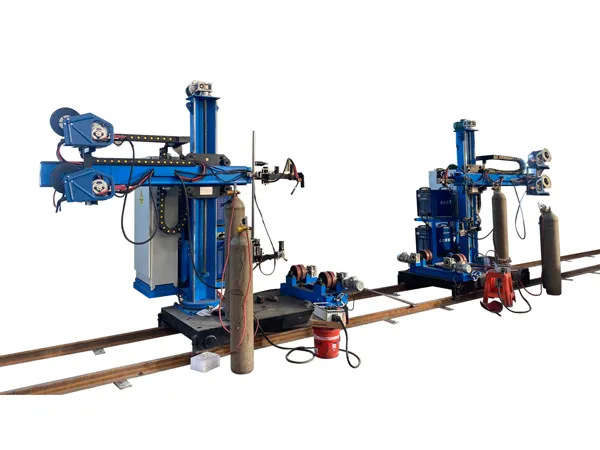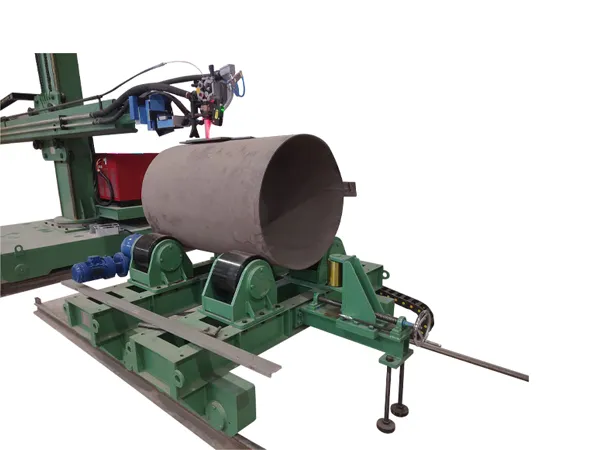Welding column and booms (also known as welding manipulators) are versatile pieces of equipment used to automate and improve the efficiency and quality of welding, especially for long, circumferential, or repetitive welds on large workpieces. They primarily differ based on their mobility, size/capacity, and sometimes the degree of articulation or control.

Description: The base of the column is bolted directly to the workshop floor or a heavy foundation.
Use Case: Ideal for dedicated welding stations where the workpiece is brought to the manipulator. Often used for repetitive tasks on similar-sized components.
Pros: Very stable, takes up a defined footprint.
Cons: Lacks mobility; workpiece positioning is critical.
Description: The column is mounted on a heavy base equipped with casters or wheels, allowing it to be moved around the workshop. It might be moved manually or have a simple motorized drive for positioning.
Use Case: Offers flexibility to move the manipulator to different workpieces or work areas within a bay.
Pros: More versatile than fixed types for varied job locations.
Cons: May require leveling or outriggers for stability during operation, especially for larger models.
Description: The column and boom assembly is mounted on a motorized carriage that runs on precisely laid rails or tracks on the floor.
Use Case: Essential for welding very long longitudinal seams on items like large pipes, tanks, beams, or ship hulls. The manipulator travels along the length of the workpiece.
Pros: Accurate linear movement over long distances, high productivity for long welds.
Cons: Requires dedicated track installation, less flexible for non-linear work.

Light-Duty:
Shorter boom reach (e.g., up to 2-3 meters).
Lower payload capacity (for lighter welding heads and accessories).
Suitable for smaller workpieces or less demanding applications.
Medium-Duty:
Moderate boom reach (e.g., 3-6 meters).
Balanced payload capacity.
The most common type, versatile for a wide range of applications.
Heavy-Duty:
Very long boom reach (e.g., 6 meters and above, sometimes exceeding 10-12 meters).
High payload capacity (to support heavy Submerged Arc Welding (SAW) heads, flux recovery systems, operator platforms, etc.).
Robust construction for stability with extended reach and heavy loads.
Often incorporates features like operator platforms or seats.

Column Rotation: Most columns can rotate (manually or motorized) around their vertical axis, typically 180° or 360°, to position the boom.
Boom Elevation: Motorized vertical travel of the boom along the column.
Boom Traverse/Reach: Motorized horizontal travel of the boom.
Control Systems:
Manual Pendants: Simple push-button controls.
Joysticks: For more intuitive control of multiple axes.
PLC/CNC Control: For programmable, automated welding sequences, seam tracking integration, and precise path control.
Welding Head Mounts: Standard or custom mounts for various welding processes (SAW, MIG/MAG, TIG, Plasma).
Cross Slides: Manual or motorized slides at the end of the boom for fine X-Y adjustment of the welding head.
Seam Tracking Systems: Optical or tactile sensors to automatically guide the welding head along the joint.
Operator Platforms/Seats: For heavy-duty models, providing operator comfort and better visibility, especially when working at height.
When selecting a welding column and boom, factors like workpiece size and shape, weld type, required reach and lift, workshop layout, and desired level of automation are all crucial considerations.
No. 1 Intersection of Chuangye Avenue and Weilai Avenue,
Yiyang County,Luoyang City, Henan Province, China
+86 400-0379-069
Copyright © 2023 An Automated Welding and Cutting Equipment Manufacturer Focusing on Welding Column Boom and Welding Rotator | All Rights Reserved Technical support: ShangXian